“Treated the person behind me at Dunkin Donuts to a cup of coffee.”
– Samantha
“Treated the person behind me at Dunkin Donuts to a cup of coffee.”
– Samantha
“I complimented my coworker on her new hair style.”
– Samantha
“I bought the person behind me in line a cup of coffee.”
–
Someone mentioned to me this morning that today is World Kindness Day and I thought, Now isn’t that a nice thing to promote? Then when I gave it a little more thought it occurred to me, Isn’t it strange that we have to designate a special day in the year to make sure that we do something kind for someone?!?
When I was a child there was a little comic strip called “Good Deed Dotty”. Everyday little Dotty would do something good for somebody she saw in need and jot down in her little notebook, “That’s that for today”.
As Christian’s – or just as members of the Human Family – aren’t we called to be aware of our brothers and sisters in need, every day and do something kind for them?
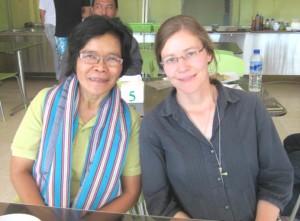
Mother Mary Joseph said, in 1945, that “Each Sister has seen her own star and had the grace to follow it.” The same “star” which led the Magi to seek Jesus in Bethlehem and to announce the good news of his birth is also guiding our own faith. It is a privilege to accompany others whose calling has inspired them to become Maryknoll missioners.
Since I have only been in Maryknoll for ten years, this is a new and challenging ministry. I still wonder if I’m skillful and mature enough to help others to discern their own vocation. Fortunately, we are a small community united in our desire to welcome women, accompany them and pray with them. The Spirit is helping us all to be honest, caring and attentive, so I know thatwe’re in good hands.
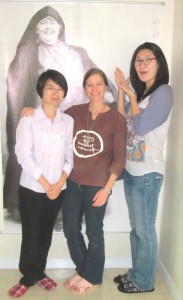
Recently, while I was in Korea, I had the chance to meet two aspirants seeking mission with Maryknoll. We had a great time sharing experiences of community, our longing to be of service and how to engage in mission. It’s not easy to be a newcomer. Especially with fewer people joining us, women must have courage. Leaving one’s home country, living within new cultures and diverse communities, require a lot of faith. I was inspired to meet them and join them in prayer as we journey together.
As Vocations Contact Person in East Timor, I try to support all those seeking Religious life and the priesthood. Indeed the harvest is plentiful…but labourers are few. Please pray for us and consider supporting our Vocation Ministry.
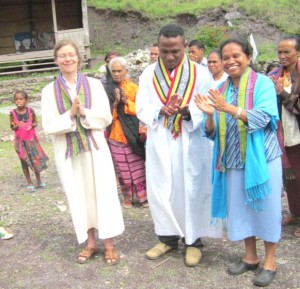
One of the unexpected gifts of mission is the chance to celebrate Liturgies of the Word. It’s a privilege to be part of a pastoral team that proclaims the Gospel and invites people to Communion. I’m grateful to our priest and to all who show up each week, thirsting for the Word and the presence of Christ. They are signs of hope and change.
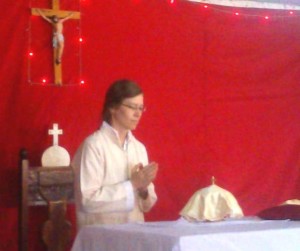
Our parish has many small chapels and six mission stations. In the past, catechists gathered the villagers on Sundays to pray the rosary or to reflect on the Gospel. Only a few places had Liturgies and Mass was a rare event. All of this changed during Lent in 2011, when Fr. Albino Marquez lamented the situation our parishioners faced in rural areas. He formed a pastoral team, including Sisters and a seminarian, to unite the parish through Sunday Liturgies of the Word.
It was daunting to face an entire assembly for the first time, but the Spirit led me through it. As I gained more experience leading the Liturgies, they became more natural and spontaneous. The rhythm and prayers of the Liturgy became a part of my being and I felt a greater reverence for the people and the ministry of the Word.
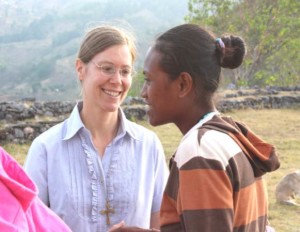
On days when I’m assigned to a chapel, I leave home after the Mass. Sometimes I drive for 40 minutes or an hour through rain, dust or construction zones. In places where the roads or rivers are hard for me to go alone, I get a ride by motorbike. I love to feel the breeze as we drive by rice fields, pine groves and riverbeds. Often the people prepare coffee or lunch, giving me another opportunity to share in their hospitality. It’s always a grace-filled chance to encounter Christ in his Body, the people.
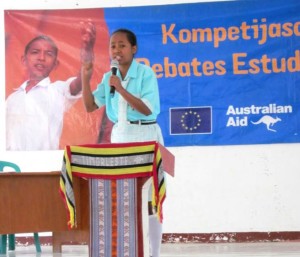
My story of leadership training and peace-building in Aileu goes back to 2008, when I came to East Timor. This mission field had been plowed, sown and cultivated by previous Maryknoll Sisters. The soil was not only fertile, but scattered with seedlings. It was up to the Holy Spirit and me to help them grow and bear fruit. In particular, two young men were very eager to work with me. Both had received basic training in the art of dialogue and wanted to share their knowledge with other youth. From this impetus, we invited teenagers to workshops and introduced them to forms of dialogue, conflict transformation and peacemaking. After two fruitful years, the group disbanded and I focused more on teaching.
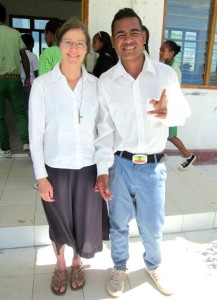
Yet in 2015, after graduating from college, João dos Santos asked me to continue this work. It was a joy to support him, witnessing to his maturity and growing passion for peace. From May to October, we co-facilitated nine workshops in various schools. João designed materials on leadership skills, dialogue and conflict transformation. He led the sessions and I took on a supportive, mentoring role. It became clearer that such skills are truly needed—and that our work is not done.
In many respects, the youth I’ve met long for peace in their families, communities and nation. Domestic violence is fairly common, while civil strife and political violence still hover like dark clouds in their collective consciousness. Fortunately, some youth have begun the critical work of looking within to see the roots of violence—and of peace—within their own lives.
May the Spirit help us to deepen & expand our work for peace!

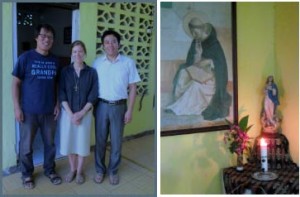
In contrast to schools in Europe, the USA, Canada and most Asian countries, many students in East Timor aspire to become priests, Sisters or Brothers. There are dozens of Religious Orders registered with the local Church that work in parishes, run schools, formation centers and various ministries. The Diocesan Seminaries are also quite crowed.
Why do so many youth in East Timor aspire to become priests and Religious? On the one hand, it’s related to high levels of unemployment, the high cost of university education, few vocational options and the privileged status of Religious in East Timorese society. Such socioeconomic factors are undeniable, but they don’t tell the whole story.
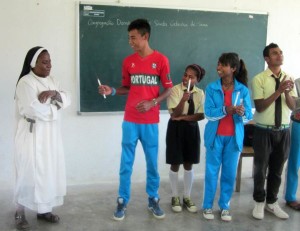
Youth in East Timor have grown up with the powerful presence of the Catholic Church. Many are very grateful to the priests, Bishops, Religious and even Pope John Paul II, who supported them in their fight for Independence. Some local priests, Sisters and Bishops are still revered as heroes or champions of a cause that took so many lives. In general, their faith in God is strong and they want the Church to play a major role in their society.
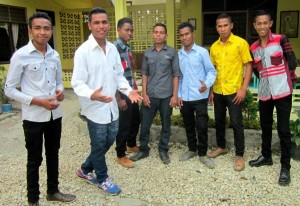
As I try to understand young women and men’s motivations for joining the priesthood or Religious life, I find common themes. One is leadership. The Church and her ministers, both men and women, play important leadership roles in society. Young people regard religious life and priesthood as ways of exercising leadership among the faithful. Service is another aspect. Nearly all aspirants speak of their desire and calling to serve others, build them up, educate and/or lead them to God.
Lastly, there is the common element of wanting to consecrate their lives to God in love. It’s a joy and honor to accompany youth who feel called to such a vocation. Discerning deeply and sorting out their motivations take time, but there are plenty of people to help them. As a teacher, I also feel called to witness Maryknoll’s evangelical life among my students and help them to discern their own call.
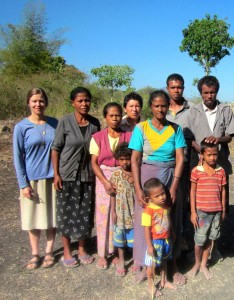
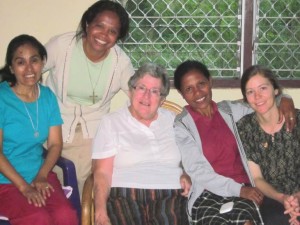
Joana and I became friends in 2008, while I stayed at the local boarding home for poor students. She was one of the women in charge and taught me so much about East Timor.
In 2013, she expressed her desire to join Maryknoll Sisters and is now in our Admissions process. I ask for your prayers and ongoing support, so that we may continue reaching out and welcoming women into our mission!